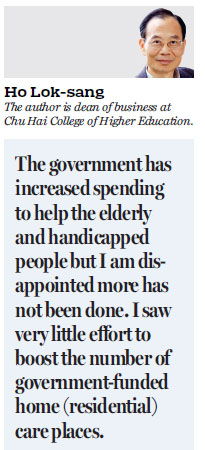Budget gives welcome break to 'middle class'
Updated: 2017-02-23 08:56
By Ho Lok-sang(HK Edition)
|
|||||||||
Ho Lok-sang analyzes the good and bad aspects of the 2017-18 Budget; he is impressed by relief measures for working people and stronger spending
The 2017-18 Budget is not much different from past ones. Recurrent expenditures are rising, however, in line with recent budgets and supporting the latest Policy Address; this is a departure from budgets released before Chief Executive Leung Chun-ying took office.
The willingness to boost spending - particularly on welfare, housing and healthcare and to a lesser extent for supporting innovation, small- and medium-sized enterprises (SMEs) and various economic sectors - has been a hallmark of the current government.
There are a number of things that I like about this budget but there are also some disappointments. First, let me go into what I like the most.
I particularly like the widening of tax bands and extending the number of years for which home mortgage interest payments can qualify for deduction from taxable income, which gives "middle class" salaried people a big relief.

I put "middle class" in quotation marks because I am referring to all those who are paying the salary tax who have not yet reached income levels that would qualify them for the "standard tax rate". This might not be the same as a sociologist's definition.
In Hong Kong, in any typical year less than half the working population pay tax; most of those who do pay only pay very little tax. This is because Hong Kong's income distribution is highly skewed.
Those people who find salaries tax a burden will generally not qualify for benefits such as public housing or Home Ownership Scheme housing. Yet their incomes are not high enough to free them from financial pressures. For those who are paying market rents, and even struggling to meet their mortgage payments, any tax relief will help.
The budget speech did not repeat what was announced earlier about relaxing the rules for collecting the Low-income Working Family Allowance (LIFA). The government abolished the absence rule under the LIFA Scheme as of Dec 6 last year; this boosts recurrent expenditure.
But abolishing this is justified, as otherwise needy people visiting relatives on the mainland may be compelled to cut short their stays. To me, helping the working poor is really justified, and helping poor people maintain strong family relations should always be a priority.
I also greatly welcome the strong support given to SMEs - especially in enhancing their technological capabilities.
Financial Secretary Paul Chan Mo-po indicated that more than 900 SMEs had registered for the Technology Voucher Program. This will provide up to HK$200,000 per firm for technological upgrades.
The Dedicated Fund on Branding, Upgrading and Domestic Sales (BUD Fund) has been extended for five years, and the SME Financing Guarantee Scheme has also been extended for one year. The cap on the contingent liability of the Export Credit Insurance Corporation under contracts of insurance has been raised from HK$40 billion to HK$55 billion.
Hong Kong needs to continuously upgrade its infrastructure. Therefore, the government is spending HK$107.2 billion for 2017-18 on capital works and other areas.
Chan said: "The government will continue to allocate substantial resources to implement public works projects that are closely related to people's livelihoods." These capital works will ultimately benefit Hong Kong's long-term competitiveness.
Now let me discuss some disappointments in the Budget.
First, I think Hong Kong really should cut its profits tax. A survey of senior business executives by KPMG late last year indicated that, while more than 90 percent of respondents believed Hong Kong's tax system was competitive, 45 percent were concerned about its future competitiveness.
The fact is that around the world the profits tax rate is falling; the 16.5-percent rate is becoming less and less impressive. In recent years corporate profit tax rates have declined almost everywhere. A European Commission study published late last year says: "Statutory and effective tax rates on corporate capital have tended to fall in recent years, presumably reflecting growing international tax competition."
The government has increased spending to help the elderly and handicapped people but I am disappointed more has not been done. I saw very little effort to boost the number of government-funded home (residential) care places.
This is important. Tragedies have occurred in these places recently. For example, an elderly man killed his senile spouse and then killed himself. An elderly parent also killed his handicapped child. These tragedies should not be allowed to happen in an affluent society like Hong Kong. Therefore, not doing more to address such issues in the Budget is to me a major disappointment.
I would also prefer to see more effort to improve our public healthcare system rather than boosting the private hospital sector. Our public healthcare system should be able to take care of the healthcare needs of all Hong Kong people. It does not have to be luxurious, but it has to be dependable. Those who can afford it can have the luxury care they desire by opting for private healthcare. But no one should be forced to seek private healthcare out of desperation.
(HK Edition 02/23/2017 page4)